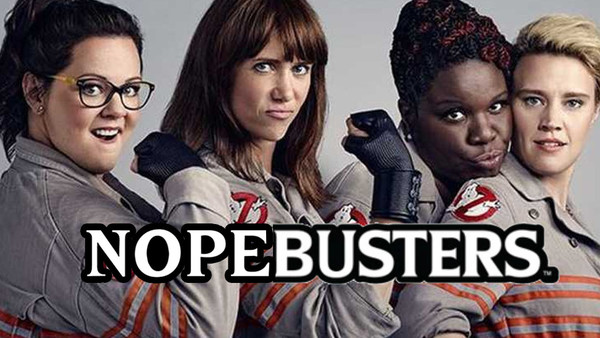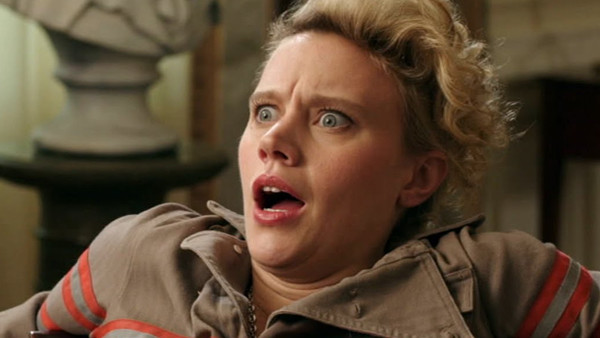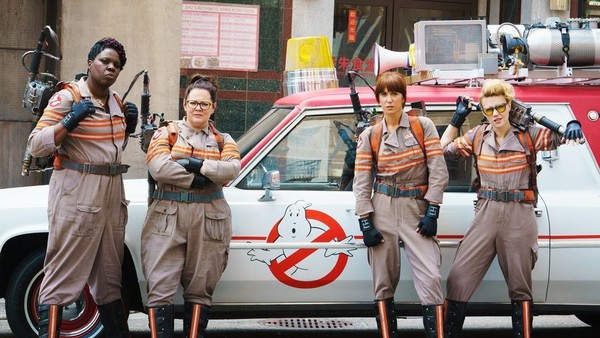Ghostbusters 3: Why Sony Are REALLY Ignoring The All-Female Reboot
In the end, Jason Reitman's threequel is all about money...

When Jason Reitman's secret Ghostbusters project was unveiled to the world, we should have all been ridiculously excited. The director is supremely talented and even more importantly, he's the son of the man who made the original movie. In the context of things like Halloween and Terminator rebooting to more closely reflect the spirit of the originals (while ignoring poor sequels), that should have been heralded as a smart idea.
But because of the toxic culture inspired by the 2016 Ghostbusters remake - particularly the distasteful way it was received online well before anyone even saw it - this conversation has turned into something else.
Despite the audience reactions to that reboot (its Audience Scores on Rotten Tomatoes and IMDB are not anomalous - they're reactive and reflective), there are now supporters of the movie coming out to say the decision to ignore the reboot and continue the original timeline is unforgivable. An open letter was penned, which is always a sign that People Are Mad.
And then Leslie Jones - SNL star and one of the group of four actors who replaced "the originals" in Paul Feig's remake - chimed in on Twitter to say she was disgusted with the decision to wipe the remake out of existence. It doesn't matter that Jason Reitman paid his respect to the remake in the announcement of the movie or acknowledged that he wouldn't be against seeing more of that timeline, he's now as much of a villain in this conversation as Sony are for canning a planned 'Busters universe with the all-female cast.
But let's be frank here. Just because an actress is militant about her reboot being ignored doesn't obligated a studio to pay attention. What they pay attention to - as if you needed to be told - is money. What they care about is audiences, not critics (which is why Ghostbusters 2016's critical score on Rotten Tomatoes doesn't matter a jot).

As many open letters as could fill a virtual post-bag can be penned about this issue but it won't change the simple fact that a continuation of that timeline simply isn't welcome for the majority of fans. And in blockbuster terms, the biggest crowd shouts the loudest, which tends to fly in the face of political movements kicked off on social media.
In that sort of environment, one account can amplify outrage and become a dangerous mouth-piece that leads to people losing their Oscar hosting jobs or movies dropping scenes or actors pulling out of roles that they didn't know were being white-washed (as in the case of the upcoming Hellboy). But this is a losing battle for anyone wanting to sell Ghostbusters 2016's second chance of life, because you can't convince a studio to change its mind on something that made no money.
Remember that sequel to Dredd? Guillermo Del Toro's Hellboy 3? Neill Blomkamp's Alien? Those were great weren't they? Sequels that fans wanted that studios made despite the fact that their predecessors didn't make enough money and they made no sense in actual business terms based on projections and facts and not people on social media saying "oh, I want that film to happen." No, they weren't, because they didn't happen.
If you build it, they will come. Equally, if you don't buy the tickets, they won't build it.
What matters to Sony on the Ghostbusters front is not the nostalgia of getting Reitman to direct. It's not that they can dial into the nostalgic fetish at the minute across all culture (Stranger Things, Sabrina, It, Halloween, Candyman, Child's Play... this is no blip, fans are chomping at the bit for new old stuff). It's not that they can get the original cast to do what they'd refused to do for three decades and mostly reunite. It's not that they have the right story to continue that timeline. They're all factors, but NONE of them would matter if Ghostbusters 2016 had made any money.
In even entertaining the idea to make that reboot in the first place, the studio were making what they thought was the right business move. They couldn't make Ghostbusters 3, because it simply wasn't an option and they thought that bringing in an all-female team would be a marketable positive. They weren't making a political decision, they were making a business one, and then, when the movie made just $229.1 million from a $144 million initial budget, they made another business decision. The mooted franchise was dead in the water.
Sony took a bath on that movie. It doesn't matter that critical reviews were mostly favourable or that it was a progressive idea to have an all-female cast or that Leslie Jones thinks a sequel should happen. Marketing costs made it necessary for a $300m return at the box office and as Paul Feig himself said, movies like that would need to make $500m. What he didn't explicitly say was that it NEEDED to make that for Sony to consider it even remotely successful and to push ahead with their plans for sequels.

In the end, losses on the movie were projected to be somewhere between $25m and $75m and the film's performance actively contributed to Sony taking a $1 billion writedown in January 2017. This isn't speculation, it's reported fact by Sony. Why the hell would they persist with a franchise that did that?
On top of that, including the all-female reboot in a continuation of the original Ghostbusters timeline makes no sense. Let's be clear here, the decision to reboot in the first place wiped out the originals (hence it being marketed as a reboot and the original cast appearing for frankly awful cameos). There was no consideration at that point to care about the originals or how pissed off anyone might be about that continuity being ended. That's how reboots work and their choice not to make it a sequel made their inclusion in Reitman's project impossible no matter how many positive lessons the director might take from that movie into his own.
What matters to Sony is that Ghostbusters 2 did what Ghostbusters 2016 couldn't. It might have a considerably worse critical rating on Rotten Tomatoes, but it made $215.3 million from a $37 million budget, initially breaking the record for the biggest three-day opening weekend gross in history (until Batman came along mere weeks later and broke it again). It ended up being the 8th highest-grossing movie of 1989 and that's what matters.
They might also have looked at the Ghostbusters video game released in 2009 for a reflection of the financial viability of continuing the timeline, as they had at the time. What they would have found was a "true sequel" - at least in the perception of fans - that was released in June 2009 and which reported North American sales of a million copies in by the end of July of the same year. That's a figure that would have raised smiles.
When Sony were considering continuing a brand they KNEW was financially viable, because Ghostbusters is, they looked at two things only. they looked at the financial performance of one film that contributed to a billion dollar writedown and they looked at one that broke records. It doesn't matter that they came 30 years apart, because studios work in absolute black and whites. One was a yes, one was a no and it doesn't matter how many open letters are written, how many tweets Leslie Jones sends, how much it's horrible that a progressive, well-intentioned movie failed... It's not personal, it's business.